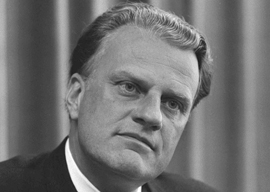
February 22, 2018

Source: Wikimedia Commons
NEW YORK—Back in the bad old days of the cocaine epidemic, there was a sheriff in Jasper County, Texas, who was visited one morning by four federal agents—two from the FBI and two from the Drug Enforcement Administration. It was a courtesy call. They didn’t really need his help. They’d already made a case on two brothers living in a trailer outside of town who were running a drug operation, and they were about to surround the house with armed officers, break down the door with a no-knock warrant, and make the arrests.
The sheriff asked for the names of the drug dealers, then said, “I know those boys. Let me call ’em first.”
The federal agents freaked out. Absolutely not. The takedown wasn’t ready.
But the sheriff was undeterred. Amidst threats from the lead FBI man, he picked up the phone, got one of the brothers on the line, and said, “You and Billy need to come down to my office, we know what you’re doing and you have to go to court for it.”
Fifteen minutes later, both brothers arrived at the county courthouse to turn themselves in.
That’s called knowing your people—knowing them so well they never fear you even when they have something to hide, because they know you’ll be fair to them.
Billy Graham knew his people. He constantly called them to live a life they thought they were incapable of, then showed them how to get there. When they screwed that up, he told them how to get back to it. When they wandered away for years and years, he showed them how little it mattered in the grand scheme of Christ. He was like the big brother you could always talk to because he would never judge you. He was the epitome of the old John Knox admonition to condemn the sin but never the sinner.
This is why he was out of fashion in the Baptist Church, and in evangelical Christianity generally. People wanted him to preach about Communism, but he wanted to preach about Christ. People wanted him to preach about Watergate, but he chose to preach about Christ. People wanted him to preach about the sexual revolution, and especially about AIDS, but he kept hammering away: Come to Christ, come to Christ, come to Christ, it covers all situations.
I don’t really want to add to the billions of words being written about Billy Graham today—his life and career are well chronicled, and his impact on Christianity firmly established—but I do want to make three points about his message that should make 90 percent of the modern Christian world ashamed of itself.
Numero Uno: Billy Graham never built a megachurch.
From his first crusade in Los Angeles in 1948, held in a tent on a downtown street corner, to his last one at the old World’s Fair site in Queens, where he preached for three days at age 86 and seemed to be gaining strength, he always had local pastors present to take charge of the people who made that long walk to the altar. He knew that the gospel is worked out in small groups, face-to-face, man-to-man, not in basketball arenas outfitted with Jumbotrons. It’s an irony of his legacy that the man who preached to more people than anyone in history—his foundation says about 215 million—believed in the Jewish idea of the minyan, the small local church, the autonomous group of people who make up the body of Christ.
Billy Graham could have founded the largest church in the world, rivaling those million-member congregations in South Korea, but he didn’t think being a pastor was his office. In fact, he always sought counsel from his own pastor—in recent years, Don Wilton of First Baptist Church in Spartanburg, South Carolina. Churches that play a numbers game, even going so far as to build sermons around real estate acquisitions, represent the very essence of confusing mammon with God.
Numero Two-o: Billy Graham was considered too liberal—and too conservative.
At the Southern Baptist Convention he was considered soft. To the so-called “mainstream” denominations, he was thought of as a fire-breather. To anyone attempting to move the culture toward secularism, he was an anachronism. This is perfectly in line with the expectation of Christians since the first century that the gospel, when preached, will be a comfort to some but an affliction to many.